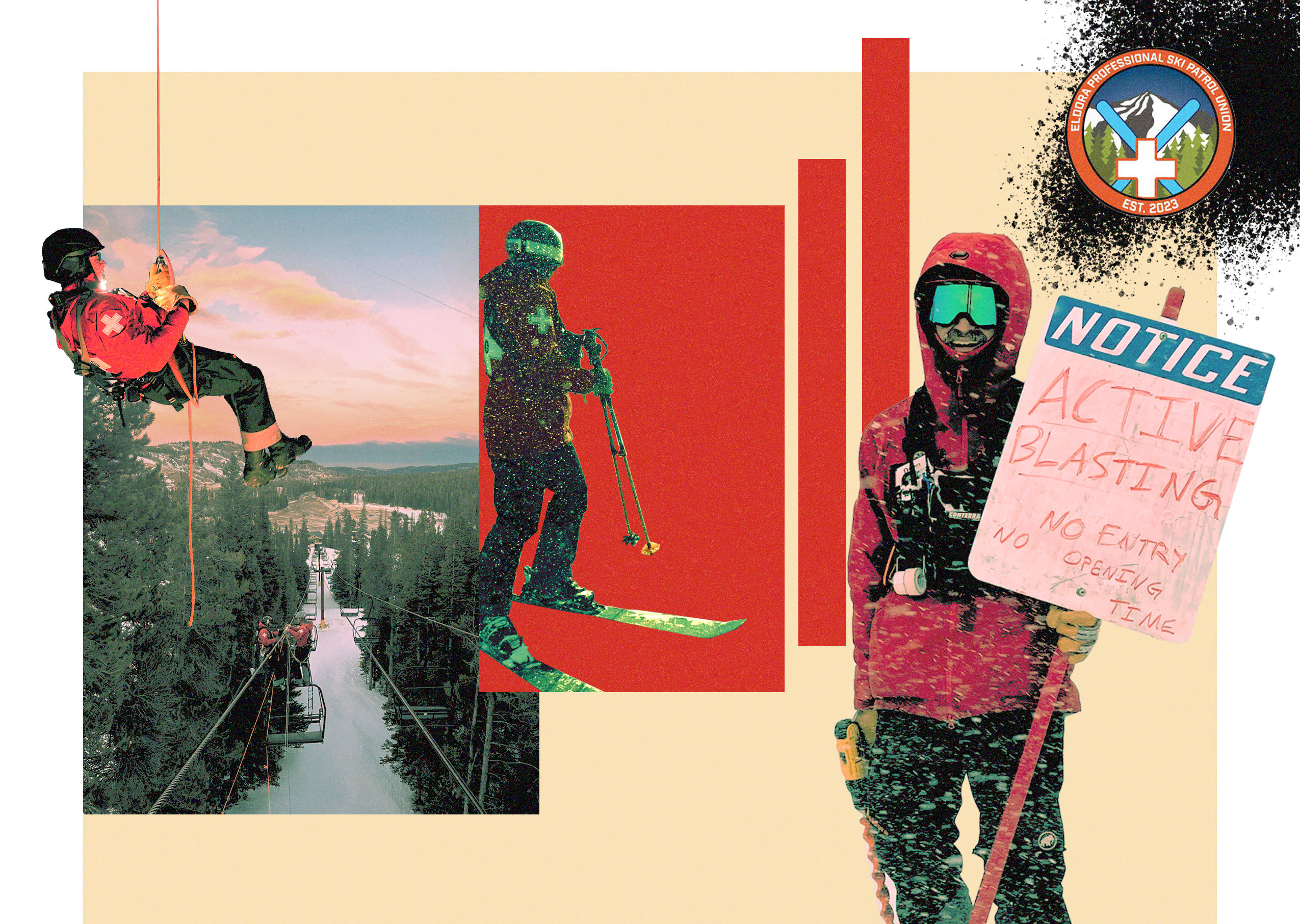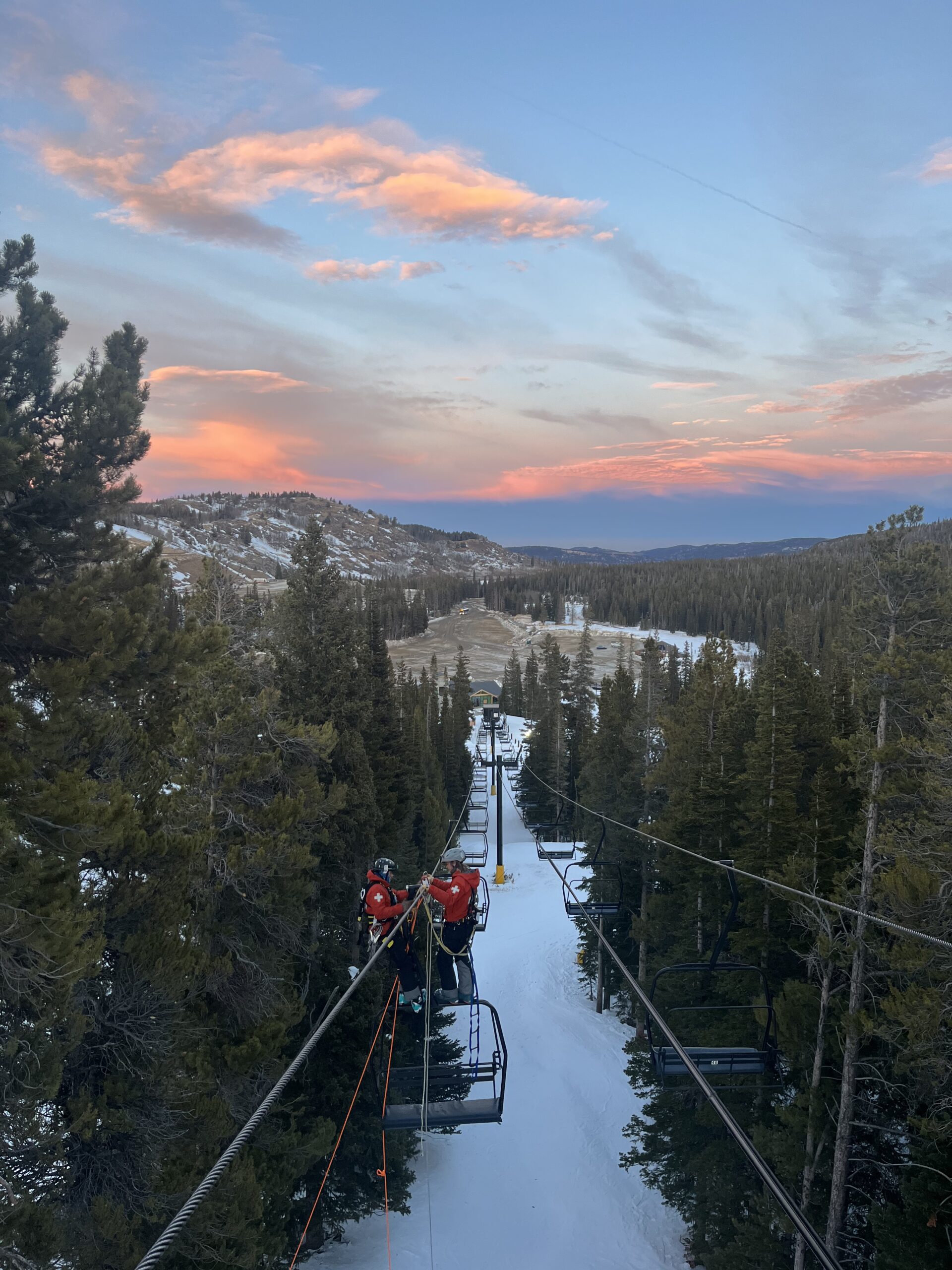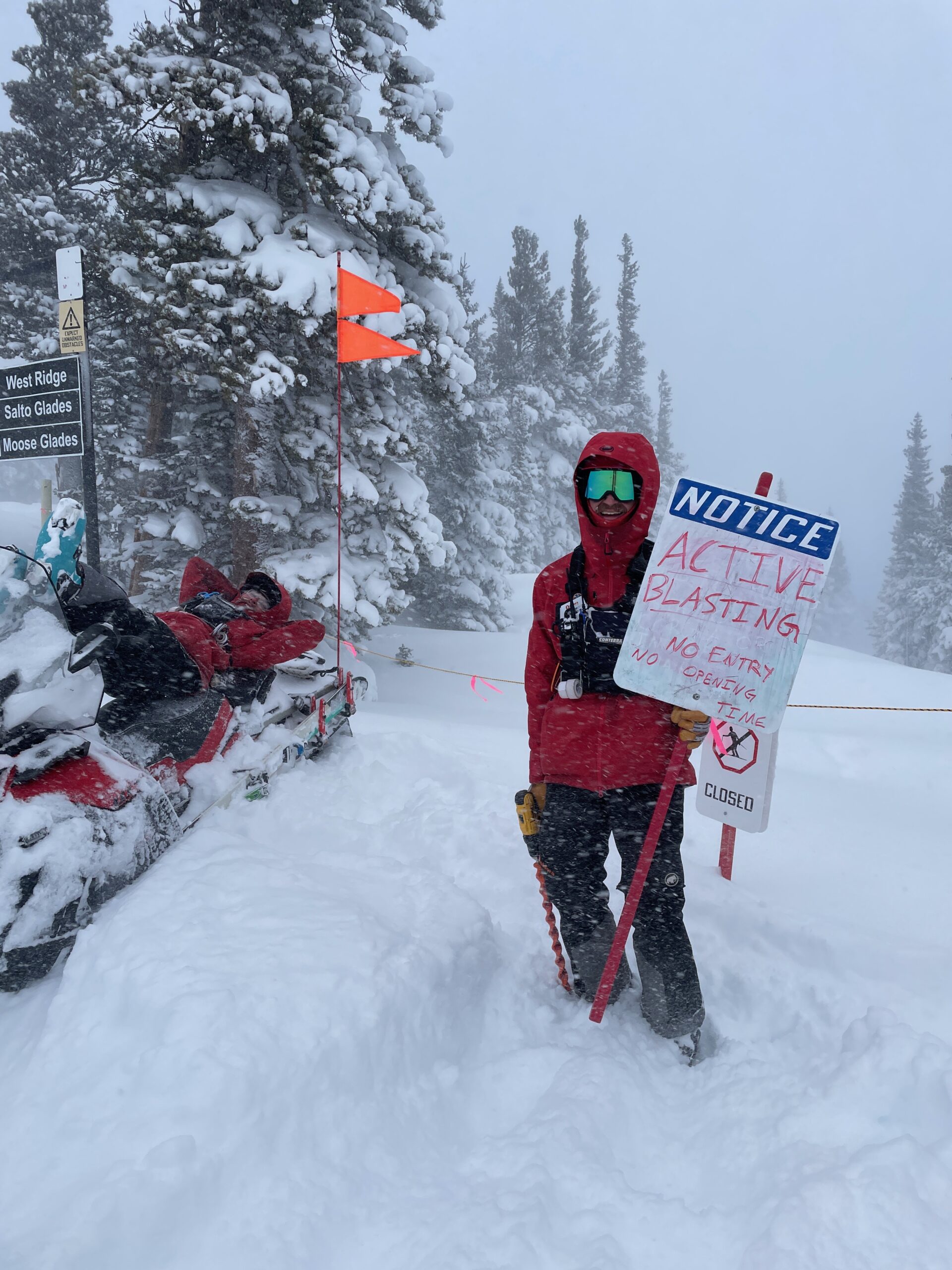
As resort owners rake in record profits, organizers are trying to unionize ski patrollers across the West — and they’re winning.
After more than a year of trying to form the first ski patrol union at Eldora Mountain Resort outside Nederland, Colorado, Nick Lansing found himself navigating an unexpected trail.
Like other patrollers, Lansing said he took the job because it fused two of his passions: skiing and helping others. In his four years on the job, he came to see it as a possible career. But Lansing and other patrollers struggled to overcome one big obstacle: wages that start as low as $19 an hour, too little to pay rent in the expensive area.
In October 2023, Lansing and about 70% of his co-workers filed a formal petition to form a union with the National Labor Relations Board. On April 1, about two weeks before the expected end of the ski season, more than 90% of the patrollers voted for the union, the Eldora Professional Ski Patrol Association.
The union is the 13th ski patrol union to either officially vote to form or petition for a union election over the last six years, according to the National Labor Relations Board. “It was a really proud moment,” said Jake Miller, who has worked at Eldora for the past three seasons. “People not only held strong in their support after a very aggressive anti-union campaign from Eldora, but actually increased their support.”
Ski patrollers across the country are similarly looking to labor unions to help them out. Since 2018, ski patrol workers at at least 16 resorts — including seven in Colorado — have launched organizing campaigns, hoping to create career pathways, improve working conditions and increase pay. Elections have been successful in most cases, although one in Keystone, Colorado, needed multiple elections before union leaders prevailed.
“Ski patrollers are a skilled labor force and should be recognized for what they’re worth,” Lansing said.
Lansing and his coworkers’ successful organizing effort is part of a fast-growing trend to unionize the workers who keep skiers safe. Data from the Bureau of Labor Statistics and the National Ski Area Association trade organization showed that about 33,000 ski patrollers work at the country’s 480 ski areas; 4,100 of them work in Colorado. And while unions represent roughly 7.6% of all ski patrollers, that is a marked increase since 2021, when around 5.5% of patrollers were represented by a union.
The past year saw a bevy of unionizing activity among ski patrollers. In April 2023, patrollers at Loveland Ski Area in Colorado voted for a union. In 2024, workers voted for unions at California’s Palisades Tahoe in February and at Eldora in April. Meanwhile, the National Labor Relations Board set dates for union elections at Utah’s Solitude Mountain Resort and Whitefish Mountain Resort in Montana. All of the unions are affiliated with the United Professional Ski Patrols of America, which represents about 700 ski patrollers nationwide and is part of the Communication Workers of America.
On a typical day, Lansing and his crew ski among the mountain’s three duty stations — which he describes as small sheds with propane heaters — to maintain the slopes and help injured skiers, Lansing said. Sometimes they shovel snow from walkways; other times, they set off small explosives to clear potential avalanches. The work also requires them to complete a year-long Outdoor Emergency Care course or be certified as emergency medical technicians, a 150-hour training course, and to be expert skiers, according to a job posting.
“It’s obviously an injury-prone job, not to mention that we work in the height of flu season,” Lansing said. “As retention goes down, the mountain becomes less safe.”
Powdr Corp., the private Utah-based company that owns Eldora, did not respond to Capital & Main’s requests for comment. An unidentified spokesperson for the company told TV station Denver 7 in February that 85% of its employees returned to work after the previous season.
At Eldora, full-time ski patrollers work 10- to 12-hour days, five days per week, Lansing said. Wages max out for entry-level patrollers at $21.50 per hour — on par with the highest level of pay for entry-level workers at the Boulder McDonald’s and below the county median wage of $31.13. Colorado’s labor laws exclude ski patrollers from overtime protection if they work less than 56 hours a week. That fact makes McDonald’s arguably a more lucrative gig, Lansing said.
For Eldora’s patrollers, a 56-hour week translates to roughly $5,200 a month, before taxes and deductions. Lansing said Eldora also doesn’t cover health insurance until patrollers come back for a third season — fueling turnover and requiring workers in physically dangerous jobs to pay for their own health care out of pocket. Meanwhile, nearly half the wages are eaten up by housing; the median rent for a two-bedroom apartment in Nederland is nearly $2,300 per month.

The push to unionize comes as ski resorts post record visits and profits. The National Ski Area Association reported that 65,387 skiers visited 480 active U.S. ski resorts during the 2022-’23 season, the most visits recorded in a single season since the organization began tracking data in 1978. The 2023-’24 season is projected to be even busier once final figures are tallied after late-season snowstorms extended the season.
Record visits have translated into record revenues for ski areas as well, according to Adrienne Saia Isaac, director of marketing and communications for the National Ski Area Association. Saia Isaac did not share specific figures with Capital & Main. Vail Resorts Inc. — the largest ski area operator in the U.S., with roughly 36% of domestic market share, according to IBISWorld — reported net revenue of nearly $2.9 billion in fiscal year 2023, with net income more than double that of 2021. The company paid its CEO Kirsten Lynch $6.2 million in salary and other compensation — the equivalent, for a full-time job, of $2,979 an hour.
Ryan Dineen, the inaugural president of the ski patroller union at Breckenridge Ski Resort, a Vail property, compared his employer to a mining company.
“We’re not going and taking gold out of the mountains, but we are going and working these mountains in order to generate revenue and generate capital for people who don’t have anything to do with this place,” Dineen said.

When Eldora patrollers first approached management about forming a union in early 2023, they hoped to improve wages and keep patrollers from leaving the resort, Miller said. They’d heard about raises at Breckenridge, whose union patrollers earn up to $32 per hour, and where turnover dropped once wages went up. A union seemed like the way to catch up, Miller said. The managers of the ski patrol seemed to support the idea, but upper management did not.
Eldora managers petitioned the National Labor Relations Board to include volunteer and part-time ski patrollers in the proposed union. But they do not rely on their wages to survive, union organizers argued, and their inclusion would have diluted the voting power of the full-time patrollers on staff. In the end, Lansing said the volunteer patrollers were able to vote in the union election. The union appealed the votes, and the votes will only be included if the union loses the appeal.
During the Eldora organizing campaign, pro-union patrollers in October submitted four demands to Eldora managers:
Little on the mountain changed in the lead up to the election, Miller said.

Wages did not budge. Some experienced patrollers got raises for returning for another season, but the floor remained at $19 per hour. Lansing estimated that 75% of the patrollers he worked with have less than three seasons of experience under their belts, and it has been particularly difficult to keep female patrollers. Out of the seven women patrollers hired for the last two seasons, Lansing said only two returned for a second season.
Now that the union is certified, the union is deciding on a wage increase. It seeks parity with other unionized patrollers, Miller said. “Ski patrolling has always been seen as a job that is fun and that young people do for a little bit and then move on to other things. And I think that’s sort of an outdated perception,” Miller said.

After the April 1 union vote, Eldora ski patrol Director Travis Brock told the ski patrol staff to say that “misconduct had taken place outside of Eldora’s control” and that Eldora planned to contest the vote, according to an email Lansing shared with Capital & Main. Brock said in the email that the company wants to “ensure our Patrollers can make their voices heard through a fair secret ballot election.”
Lansing told Capital & Main in a text message that he thinks Eldora is challenging the vote because the union is seeking to exclude the votes of volunteer ski patrollers. He added that the move is “undemocratic and is an attempt to defy our patrol’s right to win union representation.” The National Labor Relations Board will have to rule on the merits of the objection before the union is officially certified.
Lansing said organizers did not anticipate that the company would contest the election. “At the end of the day, we were focused on maximizing voter turnout, regardless of [management’s] feelings toward the union,” Lansing said.
An unnamed Powdr Corp. spokesperson said that the company “look[s] forward to continuing with this process and will continue to keep our Patrollers informed,” according to an April 1 report by Rocky Mountain PBS.
Things have changed, and gone are the days when an employee could walk into a CEO’s office and talk about pay or work conditions, said Nick Sargent, president of Snowsport Industries America, a trade association that represents ski resort operators. As a result workers are finding other ways to force the issue. “It’s a model that’s being replicated across the country,” Sargent said. “I imagine these conversations are happening at a lot more resorts than we know about. This is something that isn’t going to go away.”
Copyright 2024 Capital & Main.
Photos courtesy the Eldora Professional Ski Patrol Association.
Correction: An earlier version of this story stated that volunteers were not included in the election for the Eldora Professional Ski Patrol Association.Volunteer patrollers were eligible to vote in the election.